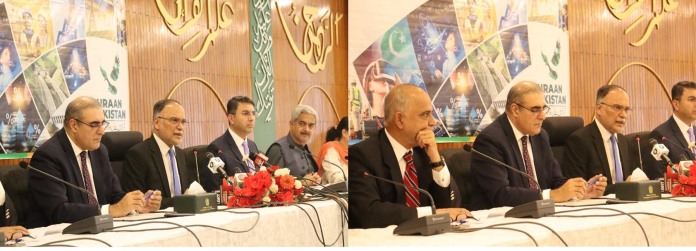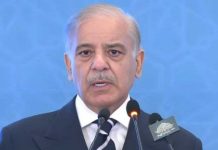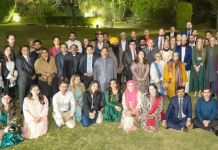ISLAMABAD, Jun 12 (APP/DNA):Federal Minister for Planning, Development and Special Initiatives, Professor Ahsan Iqbal, while highlighting development priorities of the government, said here on Thursday that Balochistan has been put on accelerated development path for which Rs230 billion have been earmarked in the federal budget 2025-26.
Addressing a press conference here, the minister said, development of Balochistan was being treated as a national responsibility, in line with the directives of Prime Minister Muhammad Shehbaz Sharif. The initiative aims to transform the socio-economic landscape of the province over the next two years through targeted investment in critical infrastructure projects to improve connectivity.
A key highlight of the development plan is the N-25 Chaman-Quetta-Karachi highway, for which Rs100 billion has been allocated. The project is expected to be completed within two to three years and will serve as a strategic corridor. In addition work will also accelerate on the M8 and several other regional infrastructure schemes aimed at boosting connectivity, promoting investment, and ensuring inclusive development.
Ahsan said, with growing concerns over the use of water as a geopolitical tool, the government attached great importance to water sector, emphasizing the urgent need to complete critical reservoir projects to safeguard Pakistan’s water security.
He said, India has attempted to use water as a weapon. While India cannot legally stop Pakistan’s water under the Indus Waters Treaty — nor will it be allowed to — it may try to disrupt flows.
To counter potential threats and ensure long-term resilience, the government is moving swiftly to complete Diamer Bhasha and Mohmand dams with storage capacity of 6 million acre feet and around 1 million acre feet respectively, bringing the total capacity to around 7 million acre feet.
The minister acknowledged that tight fiscal space, driven by structural constraints, has reduced its ability to fund development projects under the Public Sector Development Programme (PSDP). He said, the development budget has declined from 2.6% of GDP in 2017-18 to just 0.8%—a trend described as a serious structural concern for national development.
Looking ahead, the government aims to meet development and other expenditures through domestic resources, however, achieving this goal requires raising Pakistan’s tax-to-GDP ratio to at least 16%—a level already maintained by regional peers.
Talking about performance of economy, he said, the country’s economic turnaround was the result of bold, politically unpopular decisions taken by the coalition government under Prime Minister Shehbaz Sharif, aimed at ensuring long-term stability.
He said, when the PDM government came into power, many predicted it would last only a few weeks. “It was the Prime Minister’s courageous leadership and tough economic measures that saved Pakistan from collapse,” he said, adding that these reforms came at the cost of political capital but were necessary for national interest.
Iqbal highlighted the challenges faced at the start of the coalition’s tenure, including the devastating 2022 floods causing over $30 billion in damages. “Despite the crisis, we continued development funding—unlike the previous PTI government, which withheld funds for an entire quarter,” he said, accusing PTI of leaving behind a ballooning trade deficit of $50 billion and engaging in hate-based politics rather than development.
He praised the resilience of the Pakistani nation and armed forces, referencing the events of May 9 as a clear rejection of PTI’s anti-state narrative. “The PTI has become a proxy of India,” Iqbal claimed, alleging both sought to undermine the IMF program, target national institutions, and spread instability.
Iqbal noted a series of positive economic indicators: inflation down to 4%, policy rate reduced from 23% to 11%, and a booming stock market. He added that international institutions, have acknowledged Pakistan’s recovery, with global journals calling it a “miracle turnaround.”
Tax reforms have led to a record 29% increase in FBR revenue collection. Development spending also rose sharply, with the total outlay increasing by 50% in FY2025.26 to Rs4.224 trillion from Rs2.832 trillion, supported by improved provincial allocations.
Reforms in the energy sector, including restructuring subsidies and resolving issues with IPPs, have improved fiscal discipline. The government is now focusing on sustained growth driven by domestic resources, enhanced exports, and rising remittances, which have grown from $27 billion to $37 billion.
He said, government’s development plan, branded URAAN Pakistan, is already bearing fruit and projects GDP growth to rise from 2.7% to 4.2% in the coming fiscal year.
Ahsan emphasized that enhancing exports and increasing revenues were essential to placing Pakistan’s economy on a path of sustainable growth and breaking free from recurring boom-and-bust cycles.
He said that without expanding the country’s revenue base and export capacity, economic progress would remain vulnerable to external shocks. The government, he added, is committed to long-term reforms aimed at achieving stability through self-reliance and improved fiscal management.
Planning Minister Ahsan Iqbal said development of infrastructure was also a government priority adding the government was focusing on fast-tracking key regional connectivity projects, including those under the CAREC initiative, CPEC, the Indus Highway, the N-5 dualization project, the Coastal Highway project in Gwadar, and the Sukkur-Hyderabad Motorway.
Additionally, construction will begin this year on the Peshawar–Torkham Expressway, which is part of the Khyber Pass Economic Corridor. Work will also commence on the 88 km long section of the Karakoram Highway located within the Diamer Basha Dam area.
On technology, he said, under the Prime Minister’s program, more than 200,000 students have been provided with IT skills. The program, led by the Ministry of IT, aims to equip youth with modern technological education to prepare them for the digital economy.
He said, the government would launch a “Silicon Valley Pakistan” initiative to integrate various national technology programs under one platform, creating a hub for emerging technologies. In addition, it will establish a National Centre for Quantum Computing, National Centres for Nanotechnology, National Centre for Advanced Manufacturing, and Integrated Automation and Robotics Program.
To revive and strengthen the agriculture sector, the government will launch new research initiatives, particularly focused on increasing cotton production, which has declined in recent years.
While on health sector, government has allocated Rs. 64 billion for new projects, with a major focus on the elimination of Hepatitis C. The target is to achieve zero cases of Hepatitis by 2030.
On education and healthcare, the minister said, two major projects — Jinnah Medical Complex and Danish University — will place Pakistan on the global map for medical advancement and higher education. Danish University will be established as a state-of-the-art research institution.

















